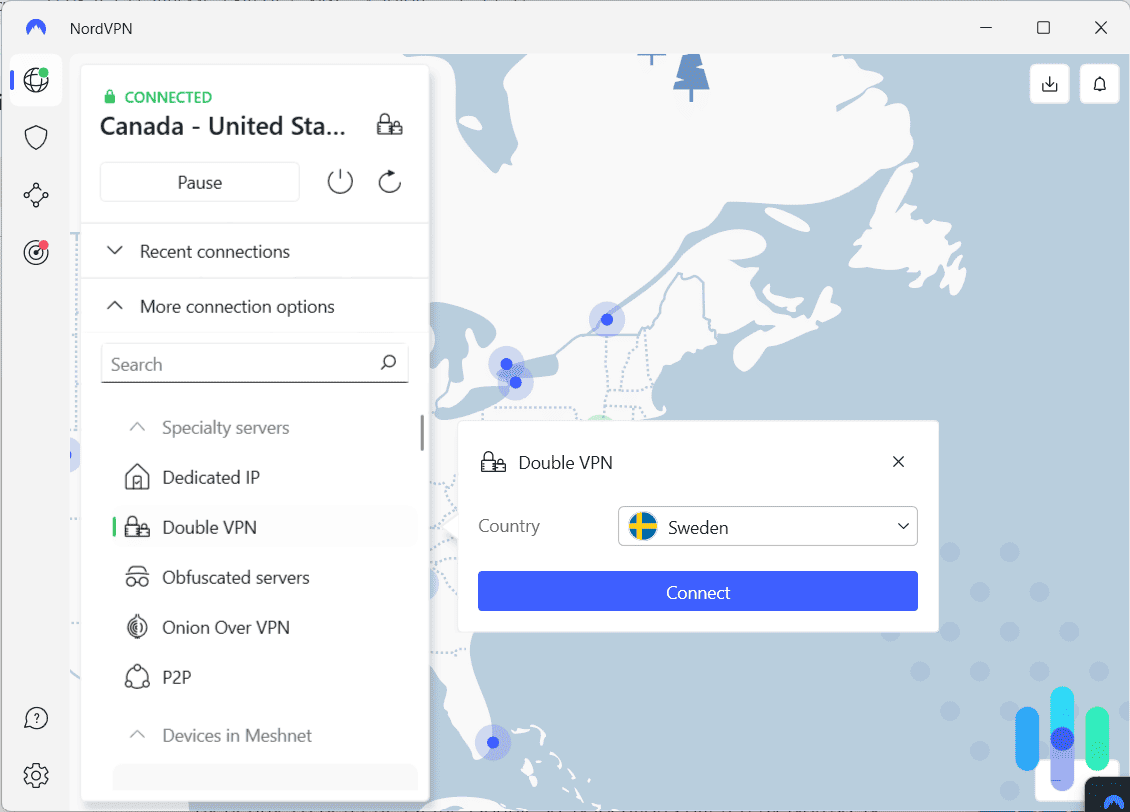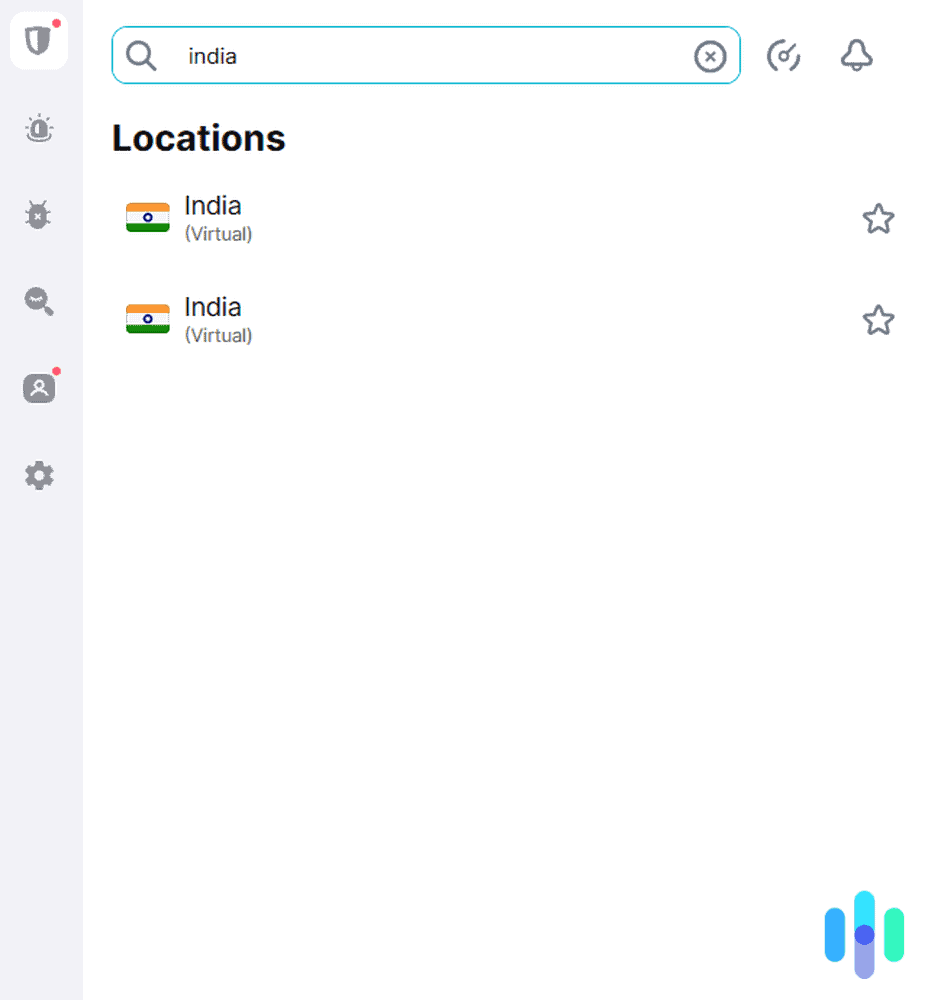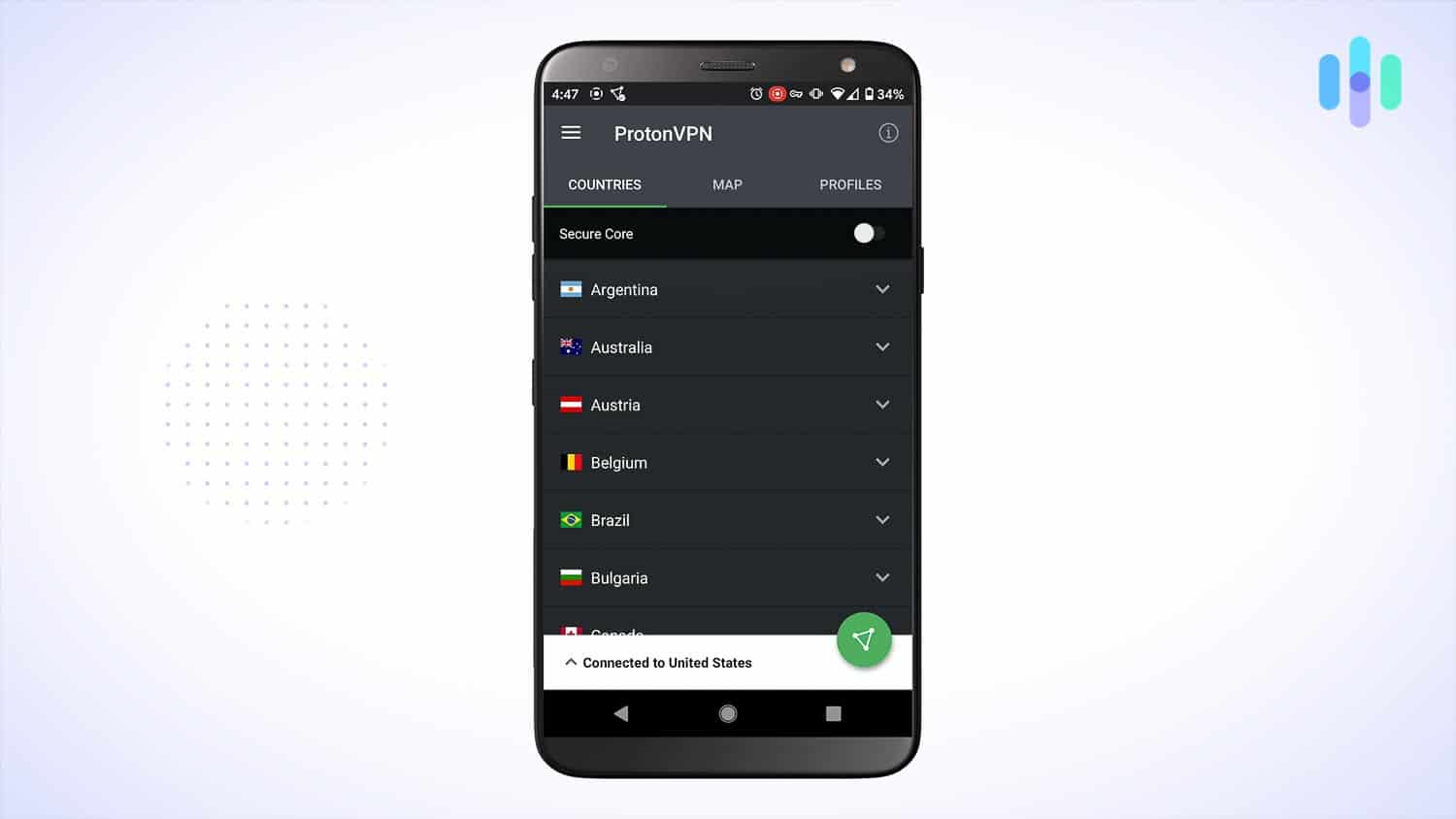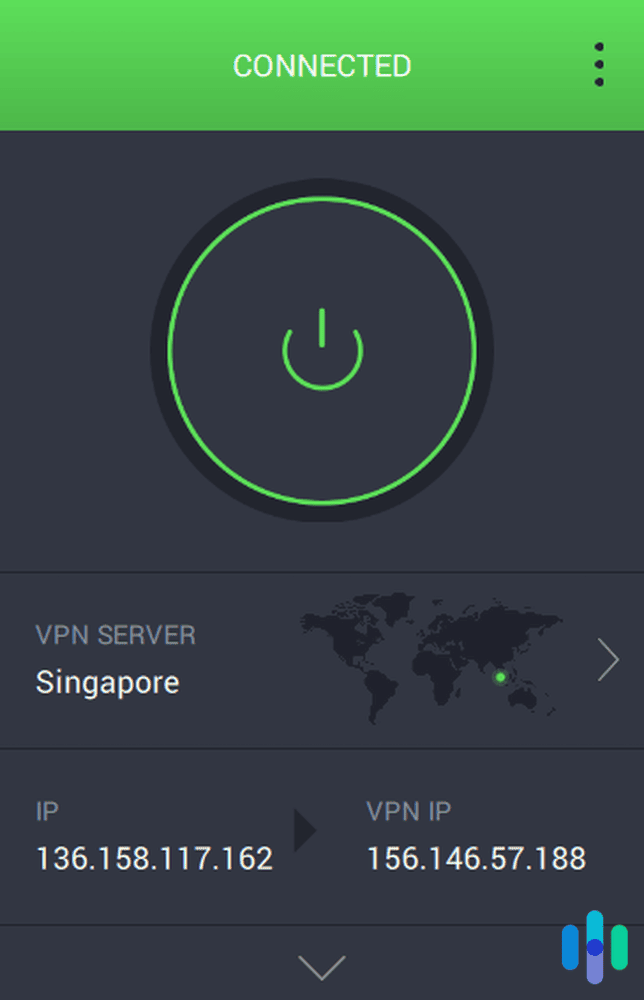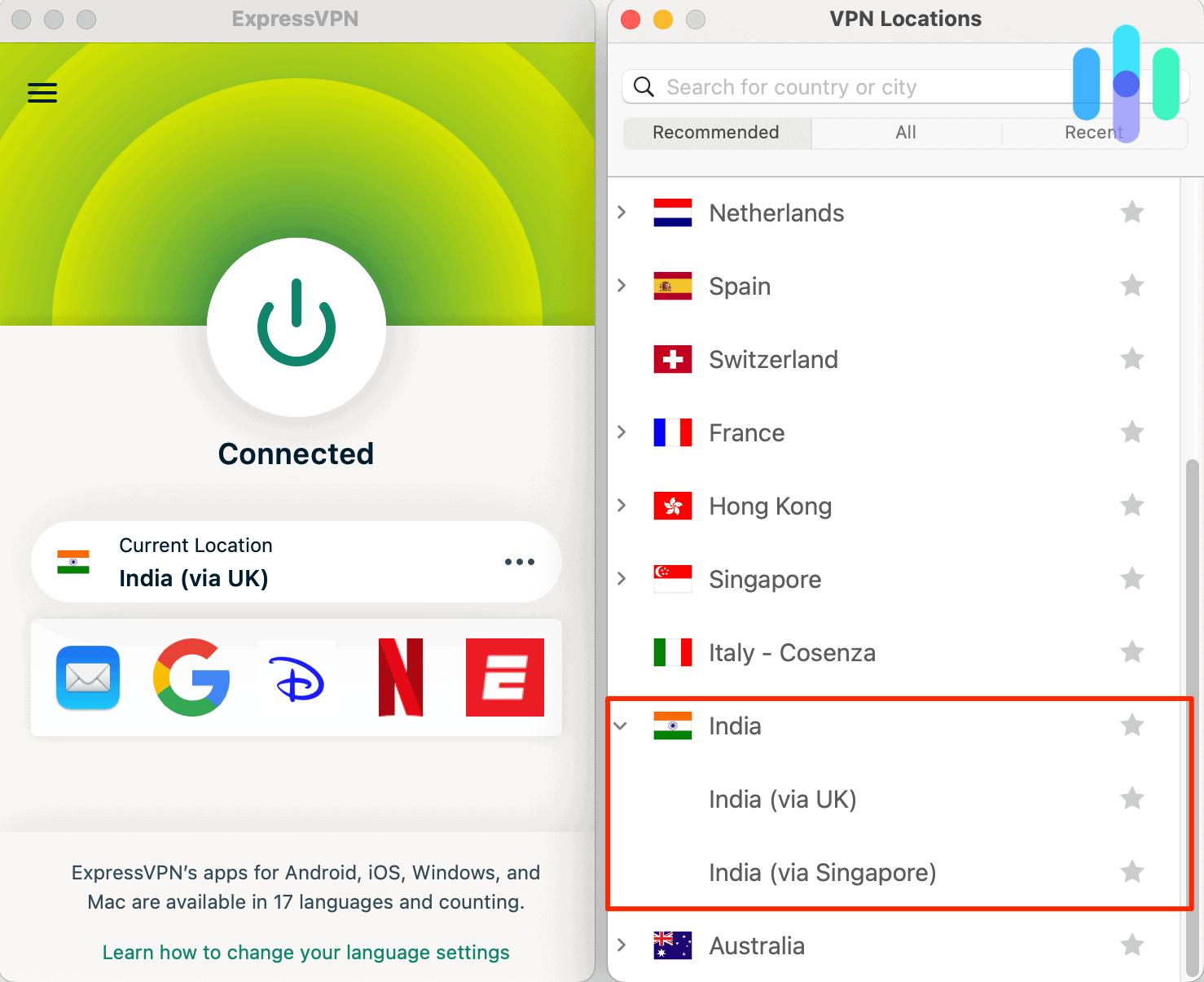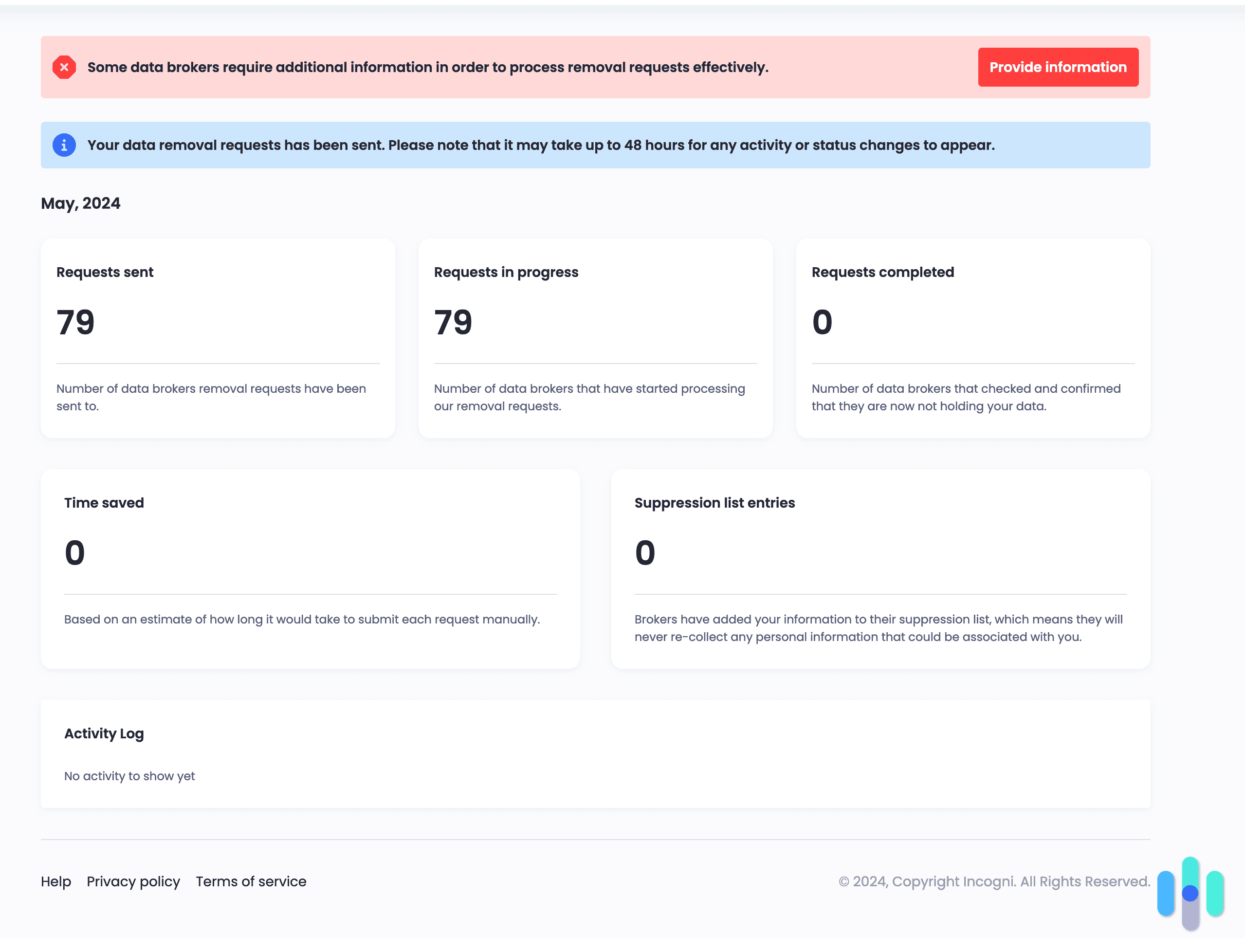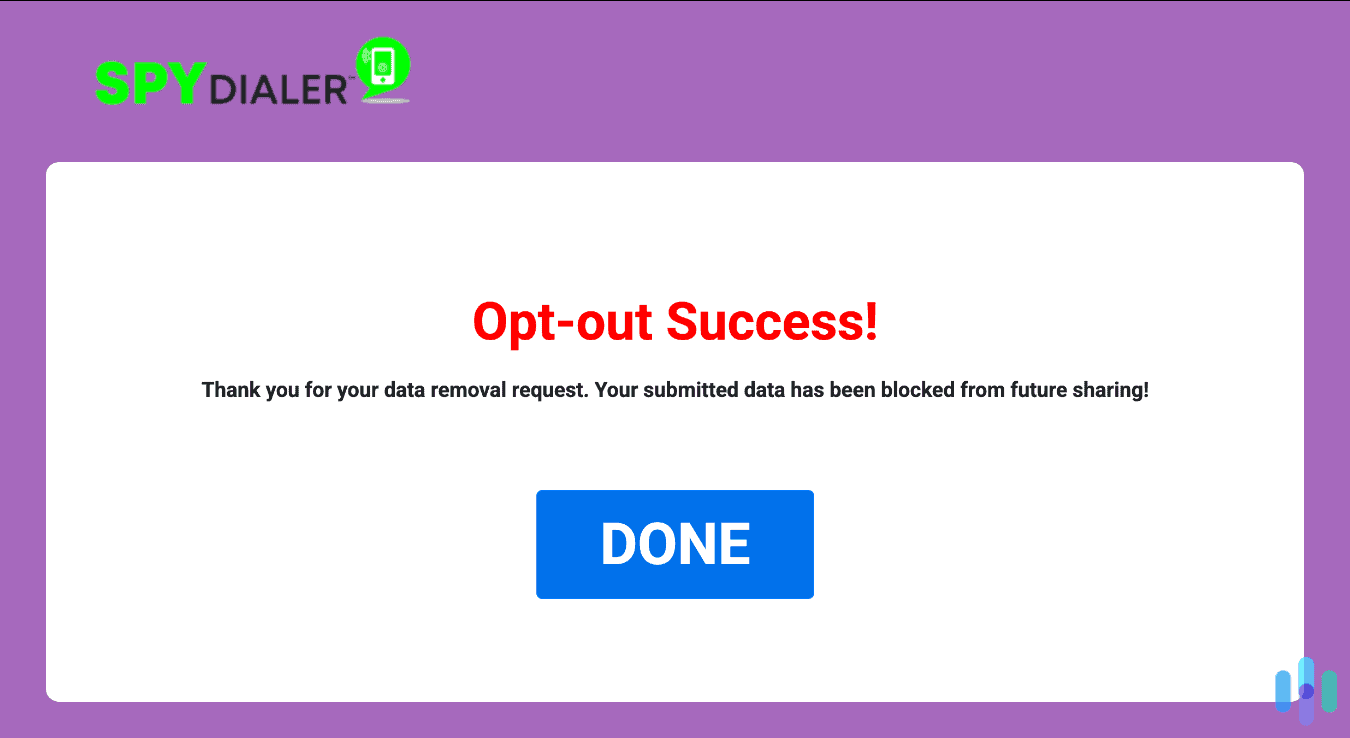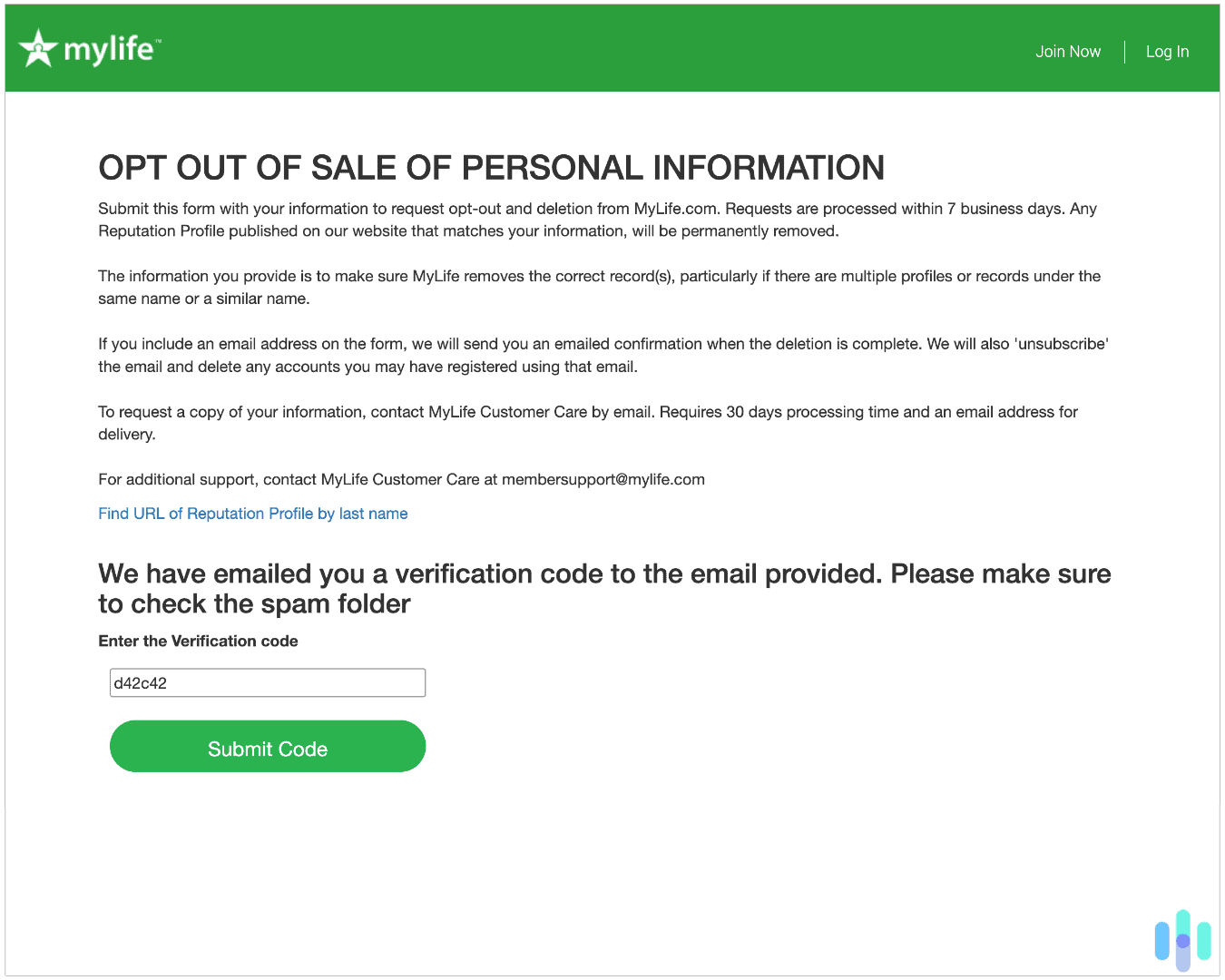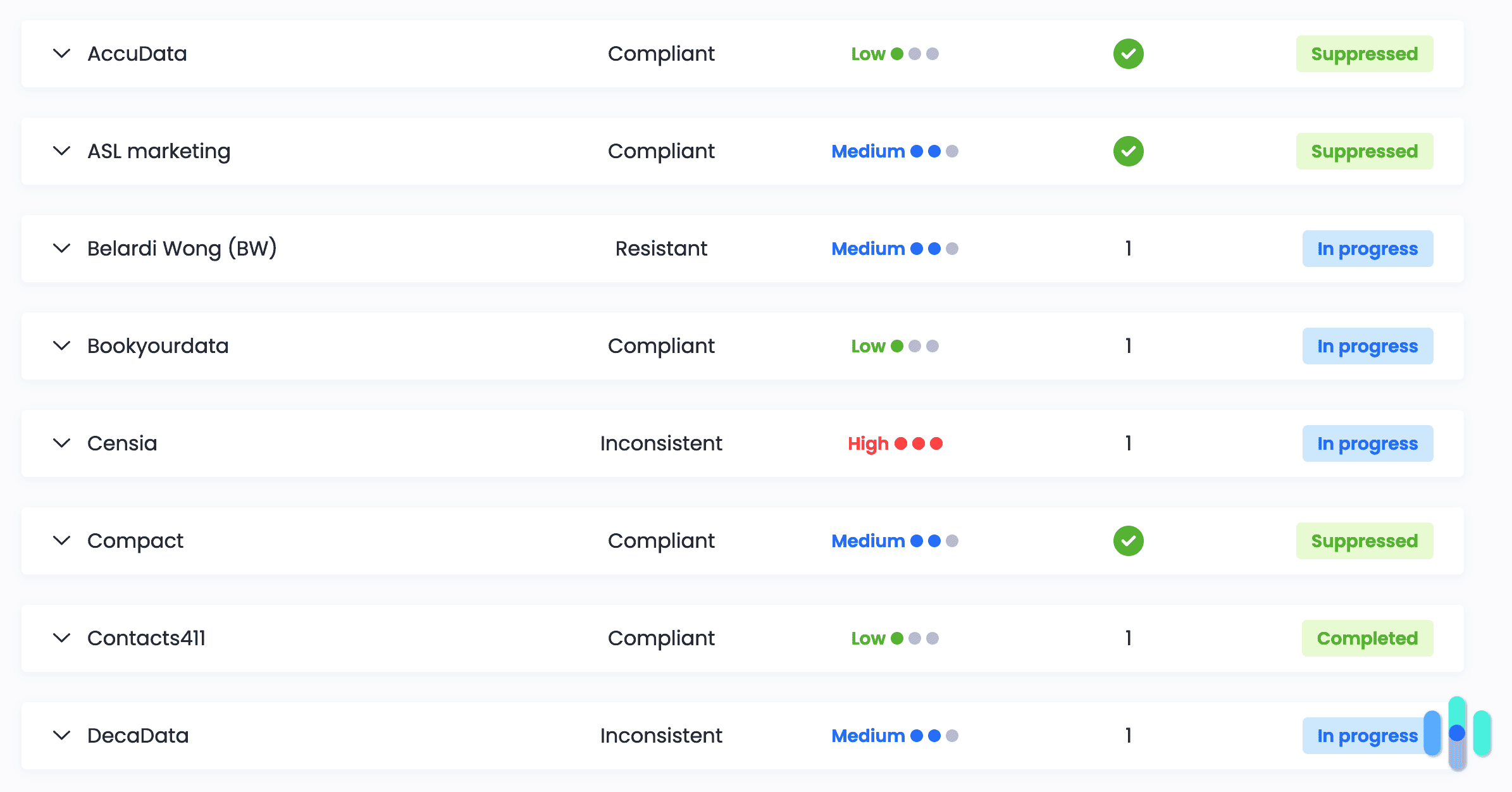The Best VPN for India in 2025
We recommend NordVPN for Indians needing protection on public Wi-Fi, access to U.S. servers, and anonymous IP addresses.
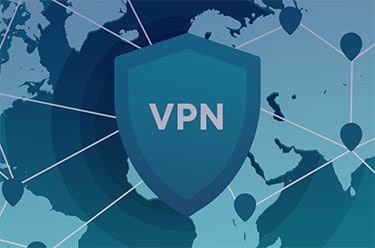

- Protects you when you’re logging on to public Wi-Fi in India
- Plenty of U.S. servers means you can log on to all your streaming services when you’re traveling in India
- Anonymous IP addresses prevent the Indian government from tracking your online movements
- Protects you when you’re logging on to public Wi-Fi in India
- Plenty of U.S. servers means you can log on to all your streaming services when you’re traveling in India
- Anonymous IP addresses prevent the Indian government from tracking your online movements

- With servers scattered throughout India, you can always get a fast connection no matter where you are in the country
- Strict privacy policy means the Indian government can never subpoena records of your online activity
- Connect to U.S. streaming accounts when you’re traveling in India
- With servers scattered throughout India, you can always get a fast connection no matter where you are in the country
- Strict privacy policy means the Indian government can never subpoena records of your online activity
- Connect to U.S. streaming accounts when you’re traveling in India
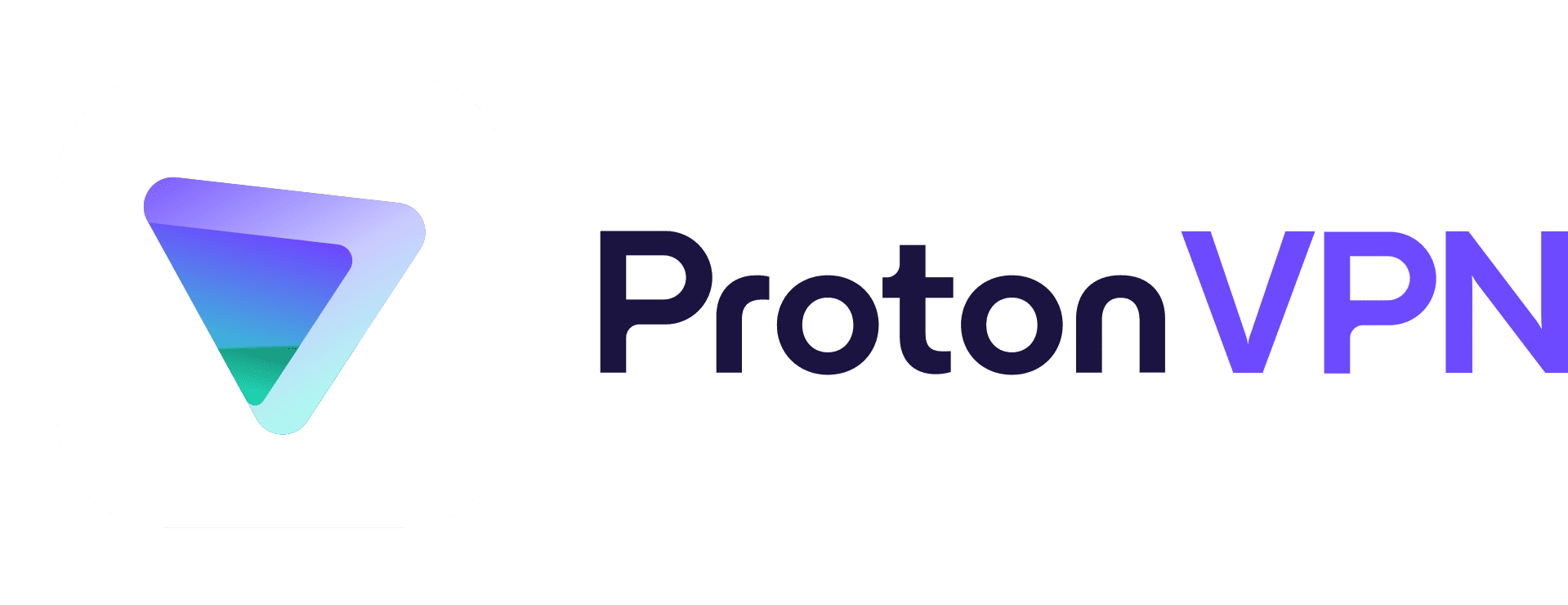
- Protects data with high-end security features, like CleanWeb and Secure Core servers
- Has an audited no-logs policy and open-source apps
- Offers Indian IPs via virtual servers
- Protects data with high-end security features, like CleanWeb and Secure Core servers
- Has an audited no-logs policy and open-source apps
- Offers Indian IPs via virtual servers
India is a beautiful country with a rich culture, a thriving tech industry, and a huge populace of welcoming people. However, a recent law passed in the country has made the online privacy status of its residents a little too concerning.
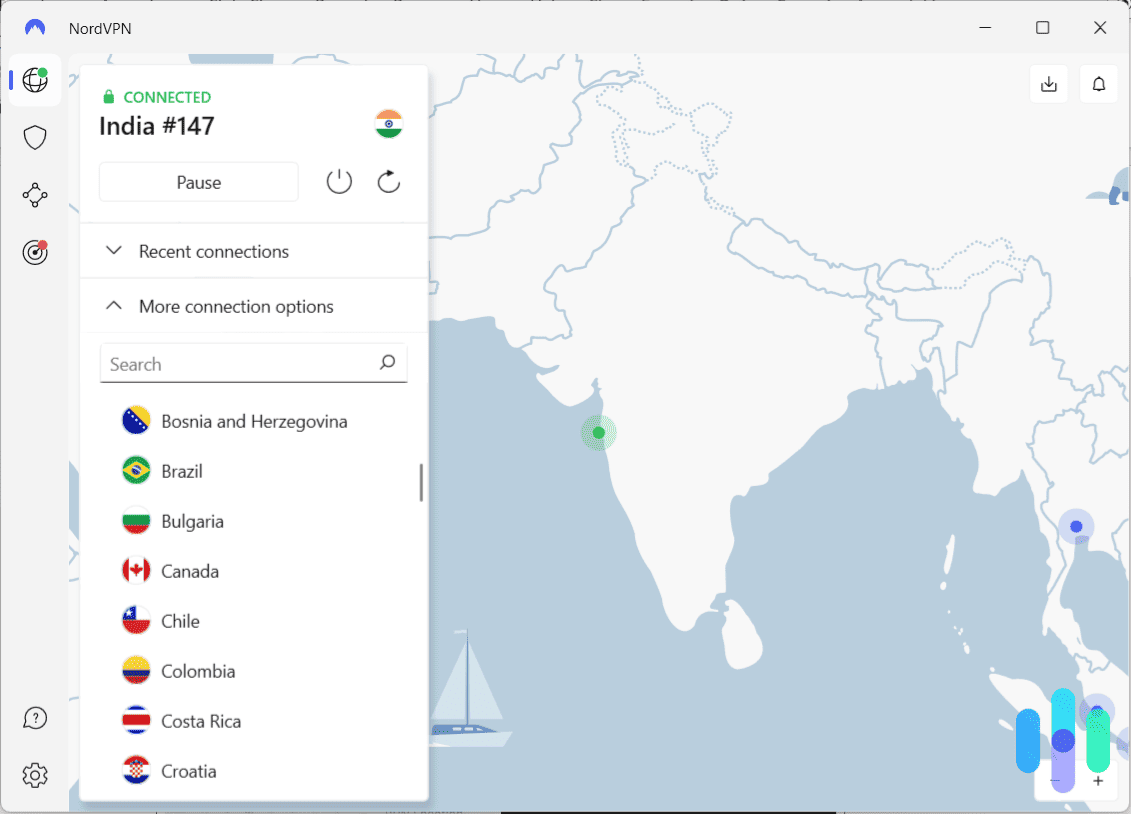
We’re talking about the CERT-In law passed in June 2022 that requires VPN operators in India to log sensitive user data.1 The move was intended to combat fraud, scams, and cybercrime, but it had severe implications for VPN companies and users. VPNs with a “no-log” policy must now record some logs or leave the country. At the same time, users connecting to an India server will no longer be able to keep their IP addresses secret.
Does that mean all VPNs with India servers are unsafe? No. Are there still good VPNs that work in India? Definitely! We know a number of VPNs that have found a way around the new law, allowing them to maintain a “no-logs” claim while providing secure India IP addresses to end-users.
Which VPNs Are the Best to Use in India?
- NordVPN - Best Privacy-Focused VPN
- Surfshark - Best for Hiding VPN Activity
- Proton VPN - Best VPN for Security
- Private Internet Access - Best for Content Unblocking
- ExpressVPN - Best for Streaming
How We Picked the Best VPNs in India
When picking a VPN for a specific place of use, we always say it’s all about location – server location, that is. But because of the CERT-In law, your safest bet is to connect to a server located in one of the neighboring countries of India, like Singapore, Malaysia, or the United Arab Emirates.
We also found a few reputable VPNs with India servers, but rather than physical servers, they use virtual servers. Virtual servers can provide India IP addresses while physically located somewhere else, usually Singapore. These virtual servers effectively sidestep the CERT-In law, while offering great speeds because they’re located near or around India.
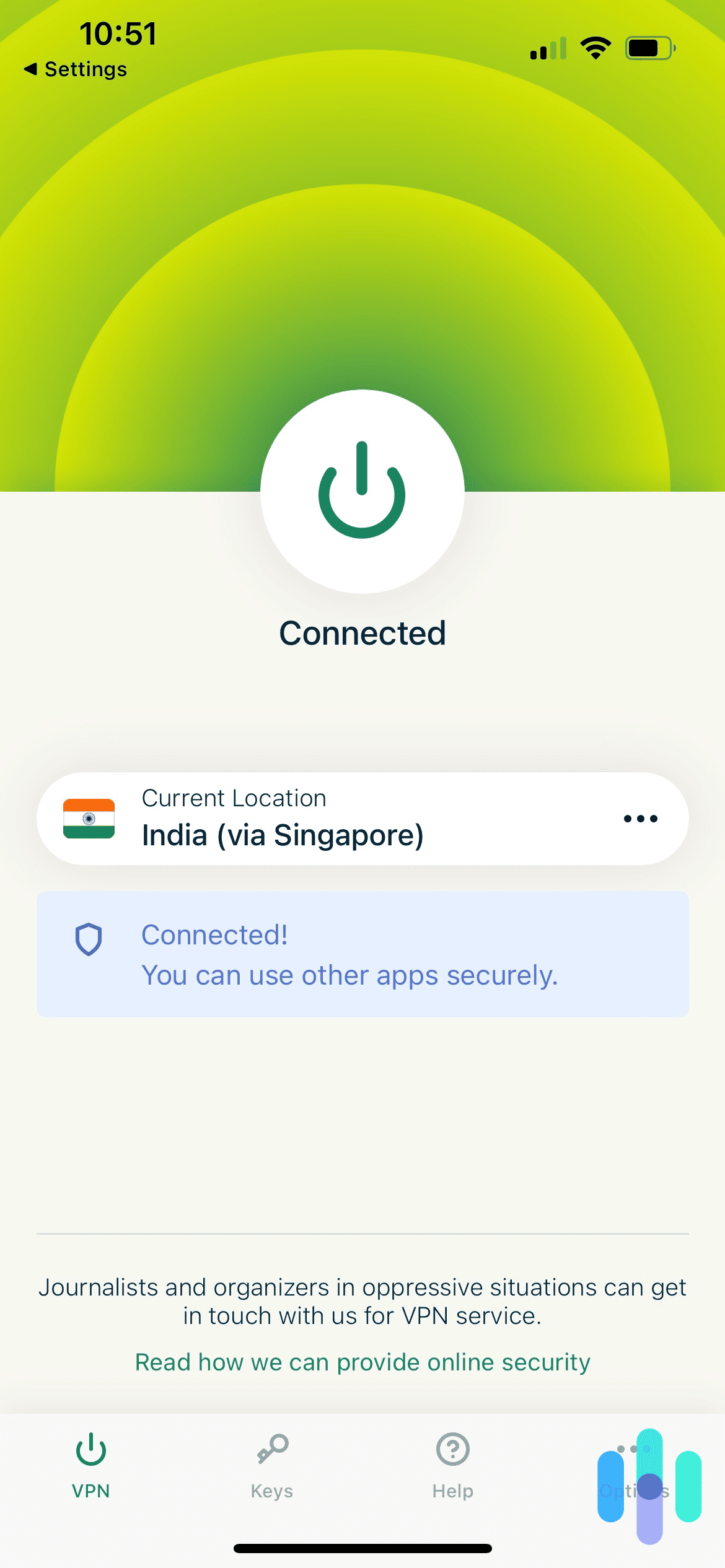
That actually helped us narrow down the options. We previously made roundups of the best Singapore VPNs and the best UAE VPNs, so we figured that those would be good starting points.
Next, we retested the VPNs, putting ourselves in the shoes of a VPN user in India. We checked their ability to unblock websites, their speed, and the user-friendliness of their apps. We also made sure these VPNs worked on a wide range of operating systems, from mobile devices to desktops. Finally, we noted whether or not they work on Linux after seeing that Linux’s market share in India is significantly higher than in most other countries.2
Got it? Great. Now let’s take a close-up look at each of our top-pick VPNs for India.
>> Related: The Best VPNs for Linux Devices
First Look: What the Best VPNs in India Offer
| System |
NordVPN

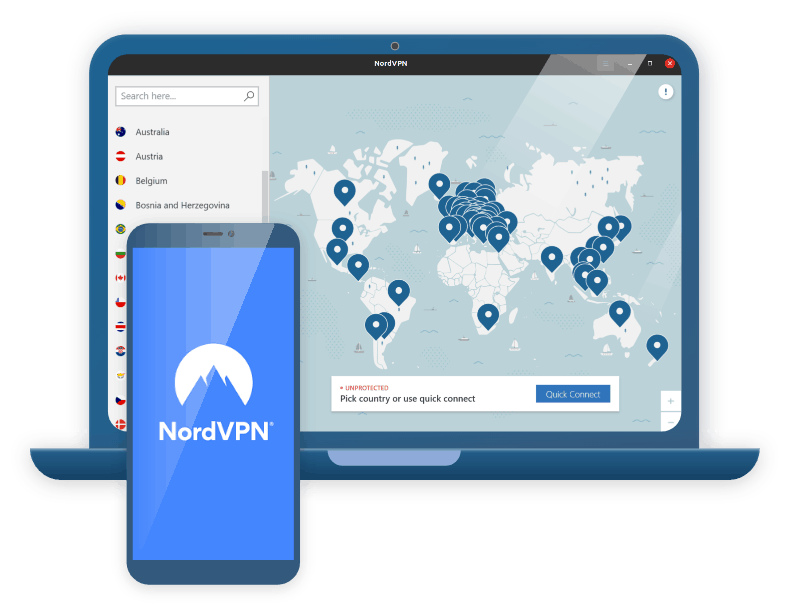
|
Surfshark


|
Proton VPN

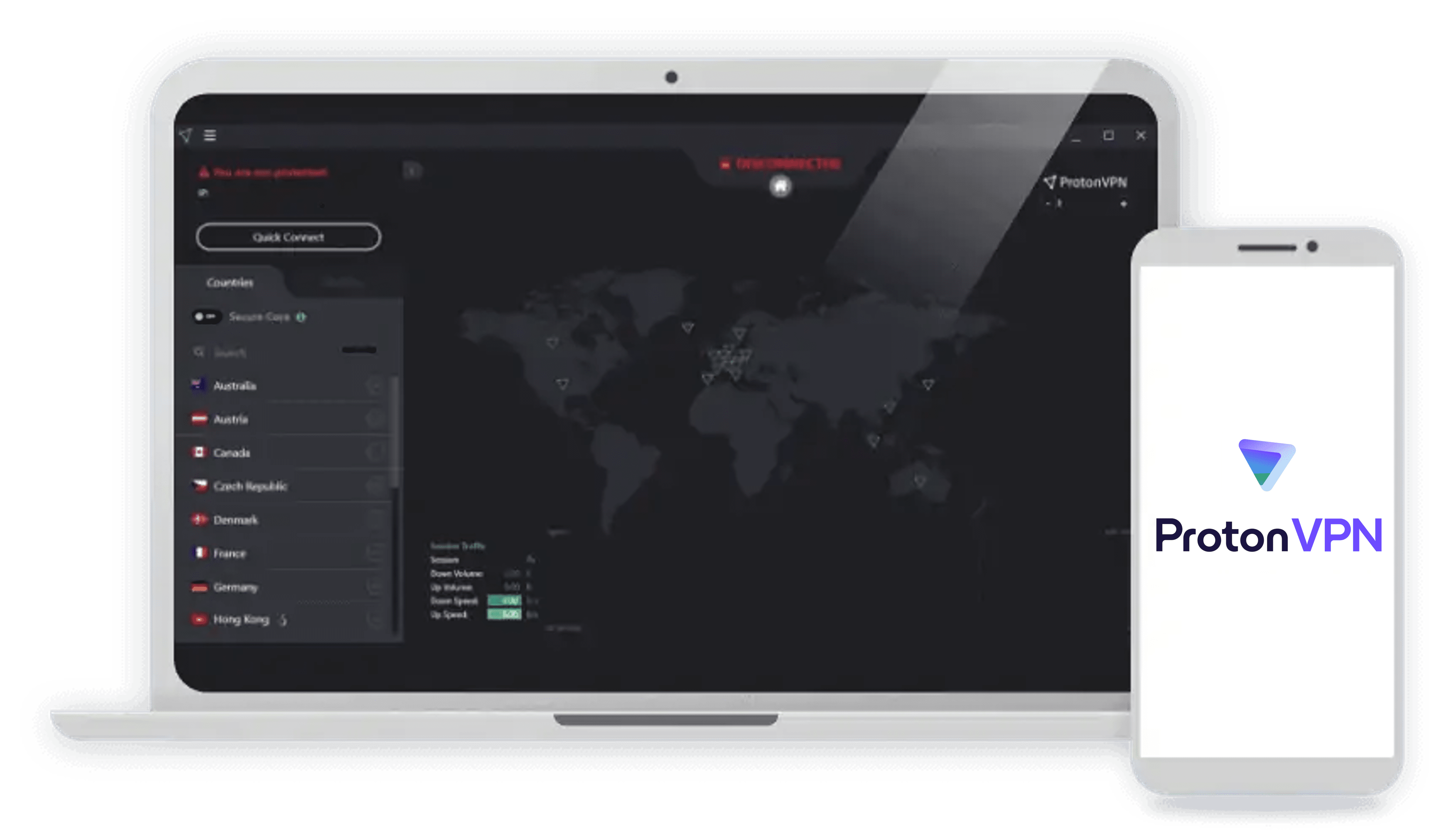
|
Private Internet Access

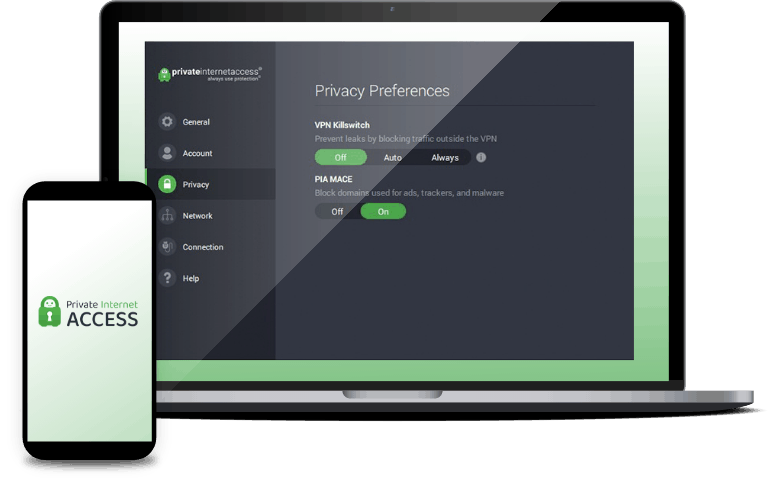
|
ExpressVPN

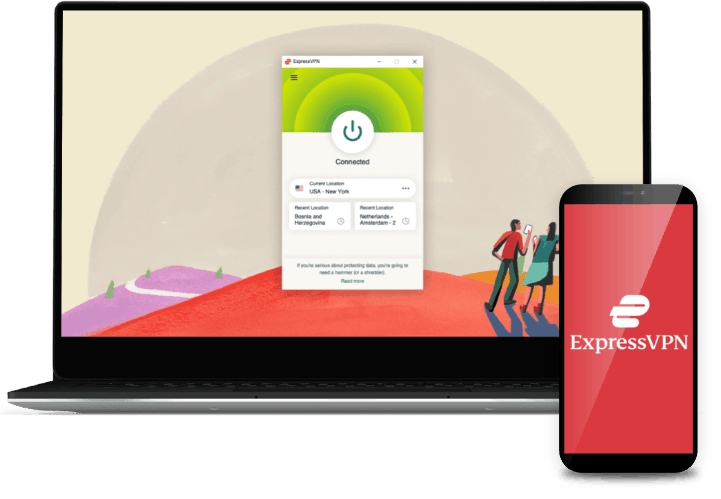
|
|---|---|---|---|---|---|
| Ranking | 1st | 2nd | 3rd | 4th | 5th |
| Ratings | 9.7/10 | 9.5/10 | 9.3/10 | 9.4/10 | 9.1/10 |
| Virtual servers in India | Yes | Yes | Yes | Yes | Yes |
| Physical servers near India | Yes | Yes | Yes | Yes | Yes |
| Overall server network | 5,900+ servers in 60+ countries | 3,200+ in 100 countries | 3,100+ in 61 countries | 10,000+ in 91 countries | Located in 105 countries |
| Available for iOS/Android | Yes | Yes | Yes | Yes | Yes |
| Available for Windows | Yes | Yes | Yes | Yes | Yes |
| Available for Linux | Yes | Yes | Yes | Yes | Yes |
| Average speed (upload/download) | 214 Mbps upload; 227 Mbps download | 209 Mbps upload; 217 Mbps download | 211 Mbps upload; 219 Mbps download | 219 Mbps upload; 233 Mbps download | 206 Mbps upload; 231 Mbps download |
| Best monthly price | $3.79 | $2.49 | $4.99 | $2.19 | $8.33 |
| Read Review | NordVPN Review | Surfshark Review | Proton VPN Review | Private Internet Access Review | ExpressVPN Review |
The Best VPNs in India Up-Close: Our Test Experience
-
1. NordVPN - Best Privacy-Focused VPN
 View Plans Links to NordVPN
View Plans Links to NordVPNProduct Specs
Multihop Yes Obfuscated Servers Yes Kill Switch Yes Split Tunneling Yes Netflix Yes Torrenting Yes 
Status of Indian Servers
NordVPN now offers virtual servers in India, but it took its sweet time. Those virtual servers were added in January 2024 – a year and a half after the law was passed. Before that, NordVPN simply removed its India servers from the list. Well, all is well now, so let’s continue.
As for servers near and around India, NordVPN has servers in Singapore, Malaysia, the UAE, Georgia, Thailand, Vietnam, and Hong Kong, just to name a few. That makes NordVPN a great VPN for traveling in East and Southeast Asia, as well as in Europe, which is where most of NordVPN’s servers are located. And on that note, NordVPN now also offers the most locations worldwide, with servers in 111 countries. That’s six countries more than ExpressVPN’s 105 locations (former top 1 in server locations).
NordVPN connected to India on iPhone
Speed Performance
Speaking of fast servers, we tested the VPN speed of NordVPN. To make our results more accurate, we connected to a server in Utah roughly 2,000 miles away from where we live. That’s the same distance between New Delhi and Singapore, the location of NordVPN’s India virtual server.
We’re happy to report that even at that distance, we got an average download speed of 227 Mbps on our 250 Mbps internet connection. That’s a nine percent decrease. The average fixed broadband internet speed in India is 62 Mbps4, so if we apply the same percentage decrease, we get 56 Mbps, which is still a great speed for downloads and streaming.
>> Check Out: The Best VPNs for Streaming
Ability to Unblock Websites
India is a democracy, but according to the reputable nonprofit organization, Freedom House, it’s only partly free in terms of online freedom.5 In particular, the organization mentions recent instances of internet filtering and censorship.
We don’t encourage breaking the law, but if you want unrestricted access to any content — even the ones blocked in your country — NordVPN is a service you can turn to. We know this ourselves because on our recent trip to China, we were able to use NordVPN to bypass content restrictions. It was one of the three VPNs we tested that worked in China.
What We Like
- Strong security and encryption standards
- Strict “no-log” policy
- Fast servers
- Specialty servers designed to bypass censorship
What We Don’t Like
- Only one virtual server in India (located in Singapore)
- Slightly pricier subscription options
- Apps are not friendly to older devices
- Some privacy features can severely reduce speed
Let’s talk about the more technical aspect of NordVPN and why it’s one of the best and most privacy-friendly VPNs right now. A NordVPN subscription, which starts at $3.79 per month, gives you access to all NordVPN apps on up to 10 devices, and all NordVPN features.
One of our favorite VPN features for privacy is multihop, also known as Double VPN. This is for those who want absolute privacy, whether for work or for activism. Essentially, Double VPN connected us to two VPN servers, each adding a layer of encryption to make our traffic uncrackable. We often use it when we’re doing investigative journalism, and with the Indian government stepping up internet surveillance, it may prove useful for some users.
NordVPN’s Double VPN feature Bear in mind that using Double VPN will most likely slow down your internet further. That’s because your traffic will have to travel farther distances (from your home network to Switzerland and then Hong Kong, for example). When we connected to a Double VPN, even though the final destination was in New York (our home base), our network speed dropped by nearly 70 percent. Of the Double VPN locations offered by NordVPN, Hong Kong and Taiwan are the closest.
>> Read More: The Best VPNs for Hong Kong
-
2. Surfshark - Best for Hiding VPN Activity
 View Plans Links to Surfshark
View Plans Links to SurfsharkProduct Specs
Multi-hop Yes Camouflage Mode Yes Kill switch Yes Split Tunneling Yes Netflix Yes Torrenting Yes 
Status of Indian Servers
Surfshark took a quick and immediate stand when the new data logging law in India was passed. It immediately announced the closure of its servers in the country, and also, that the company will be setting up virtual servers with Indian IP addresses.6
Currently, Surfshark’s virtual servers in India offer IP addresses in Mumbai and Delhi. The servers are physically located in either Singapore, London, or the Netherlands, but if you use Surfshark’s quick connect feature (which has always connected us to the nearest available server), it’ll most likely connect you to the one in Singapore.
Surfshark’s virtual servers in India >> Related: How to Change Your IP Address
Speed Performance
Since there’s no way to actually control which virtually-located server you’ll be connected to when getting an India IP address, we used the quick connect feature to test out Surfshark’s speed. It was actually pretty nifty; we just clicked the Fastest Location button and it connected us to the best available server based on our VPN settings and location. We ended up on a New York server.
Our upload speed averaged 209 Mbps while the download speed remained around 217 Mbps, a drop of about 16 and 13 percent of our network speed, respectively. The drop in speed caused by Surfshark was more dramatic than that of NordVPN, but it was still one of the fastest VPNs we tested. For example, Ivacy, another VPN we tested, caused a speed drop of over 20 percent.
>> Compare: Surfshark vs. Ivacy
Ability to Unblock Websites
Surfshark showed impressive ability to unblock censored websites. Like NordVPN, it was able to work in China and give us back access to our social media pages. Back here at home, Surfshark is one of our go-to VPNs for changing Netflix regions to unblock geo-restricted content.
Part of what makes Surfshark great for unblocking websites is its ability to hide from websites. It has this feature called Camouflage mode, which we’ll discuss in greater detail later, but basically, it obscures the fact that you’re using a VPN. And if a website doesn’t know that you’re using a VPN, it won’t be able to block your access.
What We Like
- Camouflage and NoBorders Mode
- Apps are easy to use
- Quick access to fastest server
- Unlimited simultaneous connections
What We Don’t Like
- Slower when connecting over OpenVPN
- Monthly plans are a tad too expensive ($15.45) but cheaper plans are available
- Live support powered by chat bot
- No split tunneling for iOS
We got our one-month Surfshark subscription for $15.45, although cheaper plans are available if you’re willing to sign up for at least one whole year. Still, we thought it was worth it because of Surfshark’s many impressive features, including Camouflage Mode.
Normally, when you connect to a VPN, your network will see your traffic as gibberish because of encryption. It won’t know what you’re doing, so your browsing activity and history is safe. However, the network can still see that you’re using a VPN, and if the owner of the network decides to block all VPN access, they can do so using a firewall.
VPNs are not illegal in India, but again, there are speculations that the Indian government is ramping up internet surveillance. Whether or not that’s true, the best way you can protect yourself and your privacy is to use a VPN that’s hard to detect. Camouflage Mode makes VPN traffic less obvious by taking the usual routes of non-VPN traffic. As such, it can bypass strong VPN blocks. We saw this in practice when we tested the best VPNs for school and found that Surfshark was able to stay hidden from a firewall rule we set up to block VPN traffic.
-
3. Proton VPN - Best VPN for Security
View Plans Links to Proton VPNProduct Specs
Multi-hop Yes Camouflage Mode Yes Kill switch Yes Split Tunneling Yes Netflix Yes Torrenting Yes Status of Indian Servers
Proton has always been fully prepared for situations where they might have to move their physical servers out of a country due to regulations. It has had Smart Routing (the company’s term for virtual servers) for some time, so when India passed the CERT-In law, it was able to act fast.
The virtual servers in India route to Singapore, which again, is a great location for virtual servers in the region. Other Proton VPN virtual servers — like the ones that offer IP addresses in Cambodia, Myanmar, and Malta — route their traffic to physical servers in either Miami, Romania, or Spain.
Proton VPN app >> Further Reading: The Best VPNs in Spain
Speed Performance
The speed we got from Proton VPN was decent, but not super fast. It averaged 219 Mbps for downloads and 211 Mbps for uploads, which is a 12 and 15 percent decrease, respectively. Still, those are respectable speeds. We actually consider it one of the fastest gaming VPNs because, while it didn’t have great upload and download speeds, the connections were lag-free and consistent. Also, when we connected to more distant servers like the India virtual server, the upload and download speeds didn’t drop off that much compared to when we were connected to the nearest server.
Ability to Unblock Websites
We saw the same reliability from Proton VPN’s ability to unblock content and websites, and actually, it has a special feature for users in countries with strong censorship. It’s called Alternative Routing.
Remember how we said earlier that some countries block VPN traffic? That can happen to any VPN, even the best ones out there. However, Proton VPN has a nifty way of sidestepping those blocks. When the VPN app notices that it can’t connect to a Proton VPN server because of a network block, it redirects traffic to a third-party server that’s less likely to have been blocked. That server then forwards the traffic to Proton VPN. That way, your device won’t connect directly to Proton VPN, but your traffic will still receive encryption.
>> Related: Are All VPNs Encrypted?
What We Like
- Virtual servers in India
- Alternative Routing for getting around VPN blocks
- Consistent speeds (good for gaming)
- Feature-rich apps
What We Don’t Like
- Slightly pricier
- So-so upload and download speeds
- Email support only
- Limited server locations in Asia
Proton VPN has always been focused on privacy, so if you’re concerned that your government might be spying on you, it’s a smart choice for a VPN. One particular feature we like about it is its Secure Core servers.
In the VPN industry, it’s a well-known fact that servers can be compromised. The CERT-In law is an example; your traffic may be encrypted, but the government can monitor you by requiring servers to log data.
To protect against such things, Secure Core servers utilize some sort of multihop. If you’re connecting to a high-risk country, Proton VPN routes your traffic through a Secure Core server in a privacy-friendly location (like Sweden or Switzerland). That way, if the server in the high-risk country is compromised, the government can only track traffic back to the Secure Core server and not to you.
Proton VPN’s strong server security, however, comes at a steeper price. A two-year Proton VPN subscription costs $4.99 per month. It’s still within average VPN costs, but it’s pricier than even NordVPN.
>> Compare: Proton VPN vs. NordVPN
-
4. Private Internet Access - Best for Content Unblocking
 View Plans Links to Private Internet Access
View Plans Links to Private Internet AccessProduct Specs
Multihop Yes Obfuscated Servers Yes Kill Switch Yes Split Tunneling Yes Netflix Yes Torrenting Yes 
Status of Indian Servers
Like Surfshark and Proton VPN, Private Internet Access has set up virtual VPN servers for India to replace its physical servers there. The virtual servers are located in Singapore, and since it’s near India and has one of the best internet infrastructures in the region, the virtual servers are likely going to be fast for you. It was fast even for us connecting from the U.S.
Another advantage of Private Internet Access is that it has a ton of servers in the U.S., which makes it a great VPN for unblocking content that’s only available in that region. For example, you could get a U.S. IP address to access Netflix U.S. or Hulu.
Private Internet Access connected to Singapore >> Read More: The Best VPNs for Accessing Hulu
Speed Performance
Private Internet Access’ strong server network gives the VPN some of the fastest speeds we’ve seen. On the closest server, our VPN speed averaged 233 Mbps for downloads and 219 Mbps for uploads. That’s a seven percent drop in download speed for us, so if we were to apply that to the average internet speed in India (62 Mbps), we’d get 58 Mbps. That’s more than decent for, let’s say, streaming Netflix with a VPN.
Ability to Unblock Websites
Much like in real estate, a VPN’s ability to unblock websites is usually all about location, location, location. Let’s say, for example, that you’re trying to access a website that only allows traffic coming from the U.S., like YouTube TV. If you’re connecting from India, you’ll need a VPN that offers U.S. IP addresses.
Private Internet Access just so happens to have the largest server network in the U.S. It has servers in each U.S. state — not just the major hubs. That’s why whenever we’re traveling abroad, it’s our go-to VPN to get access to websites we use back home.
>> See More: How to Change Your Location on YouTube TV
What We Like
- Servers in 91 countries (and 50 U.S. states)
- Affordable pricing
- Virtual server physically located in Singapore
- Great speeds for streaming and downloads
What We Don’t Like
- Apps are not very intuitive
- Hit-or-miss customer support
- Sign-up process could be improved
- Requires a three-year subscription for the best price
Another reason why Private Internet Access is great for unblocking content? It’s affordable. Our Private Internet Access plan cost us $79 for the whole three years, which averages out to only $2.19 per month. It’s one of the cheapest VPNs out there, giving users the extra budget to sign up for streaming services.
Once we activated our PIA subscription, we gained access to all its features, including its 91 server locations that can be used to unblock websites in any country. But it’s more than just for getting access to content; PIA is also a secure VPN.
One of Private Internet Access’ special features is its colocated servers. Most VPNs rent their servers from data centers, which means other than the VPN, the actual owners of the servers have physical access to them. With PIA, although the servers are located in data centers, the hardware (i.e., the physical servers) are owned, operated, and maintained by the company itself. No other third party can access them, making them safer from data breaches.
-
5. ExpressVPN - Best for Streaming
View Plans Links to ExpressVPNProduct Specs
Multihop No Obfuscated Servers Yes Kill Switch Yes Split Tunneling Yes Netflix Yes Torrenting Yes Status of Indian Servers
ExpressVPN’s speedy response to the CERT-In law shows its commitment to privacy. It pulled out all of its data centers in India as soon as the law was passed, and in the same month, it activated India virtual servers with physical locations in Singapore and the U.K. ExpressVPN surely moved faster than NordVPN, and ExpressVPN’s virtual servers might be better too.
You see, you can pick between the Singapore-based and the London-based virtual servers when trying to get an India IP address. The server in Singapore is most likely to offer better speed since it’s closer to India, but if you ever find it slow, you can connect to the U.K. server at will.
ExpressVPN’s India server options >> See Also: How to Get a U.K. IP Address
Speed Performance
We saw impressive speeds from ExpressVPN, which is why we think it’s the best VPN for streaming, downloading, and other bandwidth-heavy tasks. The download speed we got on the nearest server was almost equal to our Private Internet Access speed of 231 Mbps. That’s only eight percent lower than our normal network speed, so we didn’t have any problems with buffering or lag while using ExpressVPN.
>> Learn More: Private Internet Access vs. ExpressVPN
Ability to Unblock Websites
While ExpressVPN didn’t offer any special features for unblocking websites, we found it consistently capable of giving access to geo-restricted content. It consistently ranks as one of the top options for streaming services, like in our roundup of the top Netflix VPNs and best Disney Plus VPNs.
We really liked that the apps were easy to use, too. ExpressVPN’s mobile and desktop apps have similar interfaces, and they are really simple to navigate — just click on the large power button at the center to connect. The apps you frequently use after connecting to ExpressVPN (like Netflix and Chrome, for example) also appear in the interface, so you can click or tap on them for quick access.
What We Like
- Simple and easy-to-use apps
- Fast download speeds
- 105 server locations
- Reliable unblocking ability
What We Don’t Like
- Lack of advanced features
- Expensive subscriptions
- Limited customer support availability
- Not very customizable
One of ExpressVPN’s strongest features is the Lightway protocol. All VPNs use a VPN protocol, which is a compilation of rules that decide how your traffic is handled during tunneling. It tells the VPN which network port to use, how to encrypt your data packets, how to authenticate connections, and so on. As such, the VPN protocol has a hand in how secure and fast a VPN can be.
Most VPNs use OpenVPN and WireGuard. ExpressVPN, on the other hand, opts to use a self-designed protocol called Lightway. In our testing, we found that Lightway is a speedy option. It’s what we used when we got the 231 Mbps reading from ExpressVPN. When we switched to OpenVPN, which ExpressVPN also offers, the download speed dropped to below 210 Mbps.
Now, ExpressVPN isn’t the only option that has its own VPN protocol, but of all the self-designed protocols we tested, it’s certainly in the top three. The other two are NordLynx from our top-pick NordVPN, and Catapult Hydra from Hotspot Shield.
>> Learn More: Hotspot Shield Review
The Legal Status of VPNs in India
That’s about it for our recommended VPNs in India, but before we end this review, let’s briefly discuss a little bit more about VPN use in India, starting with whether or not VPNs are still legal.
Before using a VPN in any country, it’s important to check if using a VPN is legal in that jurisdiction. VPNs are legal in most places, but there are some countries where they’re not. And often, if you use a VPN in those countries, the consequences can be as severe as hefty fines or jail time.
In India, fortunately, VPNs are still legal. The CERT-In law is directed toward operators and companies rather than users. It requires them to store user information for up to five years. However, that requirement may affect users as well, because it’s our data that’s being stored. If sensitive information like IP addresses and browsing history is logged, it’s more susceptible to data breaches and government monitoring.
That said, with many VPN companies closing down their physical servers in India and them putting up virtual servers, VPN users connecting to and from India shouldn’t be affected by the CERT-In law.
How to Set Up VPNs
Another concern we had when we heard about the new law was, “Will internet providers in India start blocking VPNs that don’t comply with the data logging requirements?” Because if that’s the case, then it will make it harder for users in the country to buy subscriptions to and set up secure “no-log” VPNs.
Fortunately, the answer is “no.” You can still access the websites of the five VPNs we recommend for India, as well as other VPNs that have closed their India servers. Here’s how you can set up your VPN:
- Buy a subscription. You can do this by going to the VPN’s website and signing up.
- Download the VPN app for your devices. For smartphones, you can get the apps from the Google Play Store or the Apple App Store. For desktops, you’ll find the installation file from the VPN website’s download page.
- Install the VPN and log in.
- Choose a server location and start connecting.
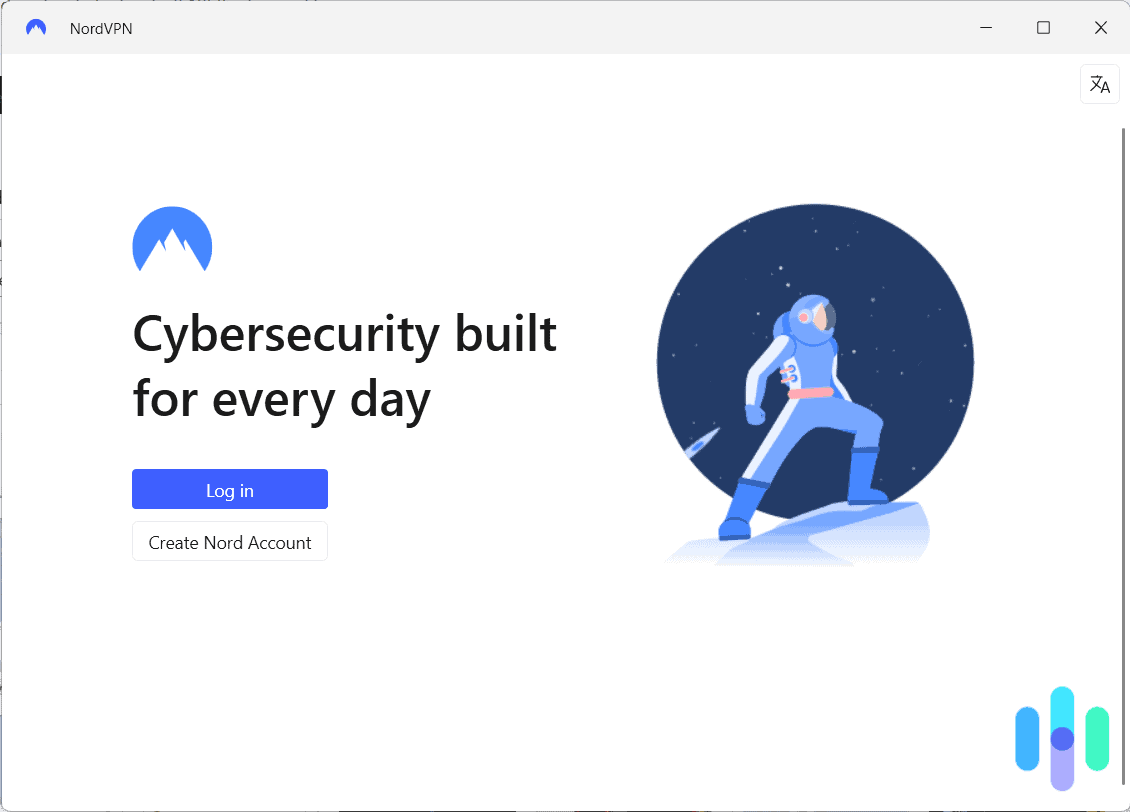
How to Choose a Server
One of the keys to successfully using a VPN is choosing the right server location. This will depend on what you’re trying to accomplish.
- If you need an Indian IP address: If you’re trying to connect to a website that allows traffic only from India, you should connect to a virtual server that offers Indian IP addresses.
- If you need increased security and privacy: If the virtual location doesn’t matter, you can connect to any fast server you can find. Usually, it’s the one nearest to your physical location. Since the top VPNs have closed down their physical servers in India, look for servers in neighboring countries. Singapore is usually a good server in Asia because of the country’s fast internet.
- If you need access to a site blocked in India: There are a lot of sites blocked by internet providers in India. If you need access to one of those sites, simply connect to a server in a different country (assuming the site isn’t also blocked there).
- If you need a country-specific IP address: On the other hand, if you need to access a country-specific content — for example, Netflix Japan — you’ll need to connect to a server in that country to get a corresponding IP address.
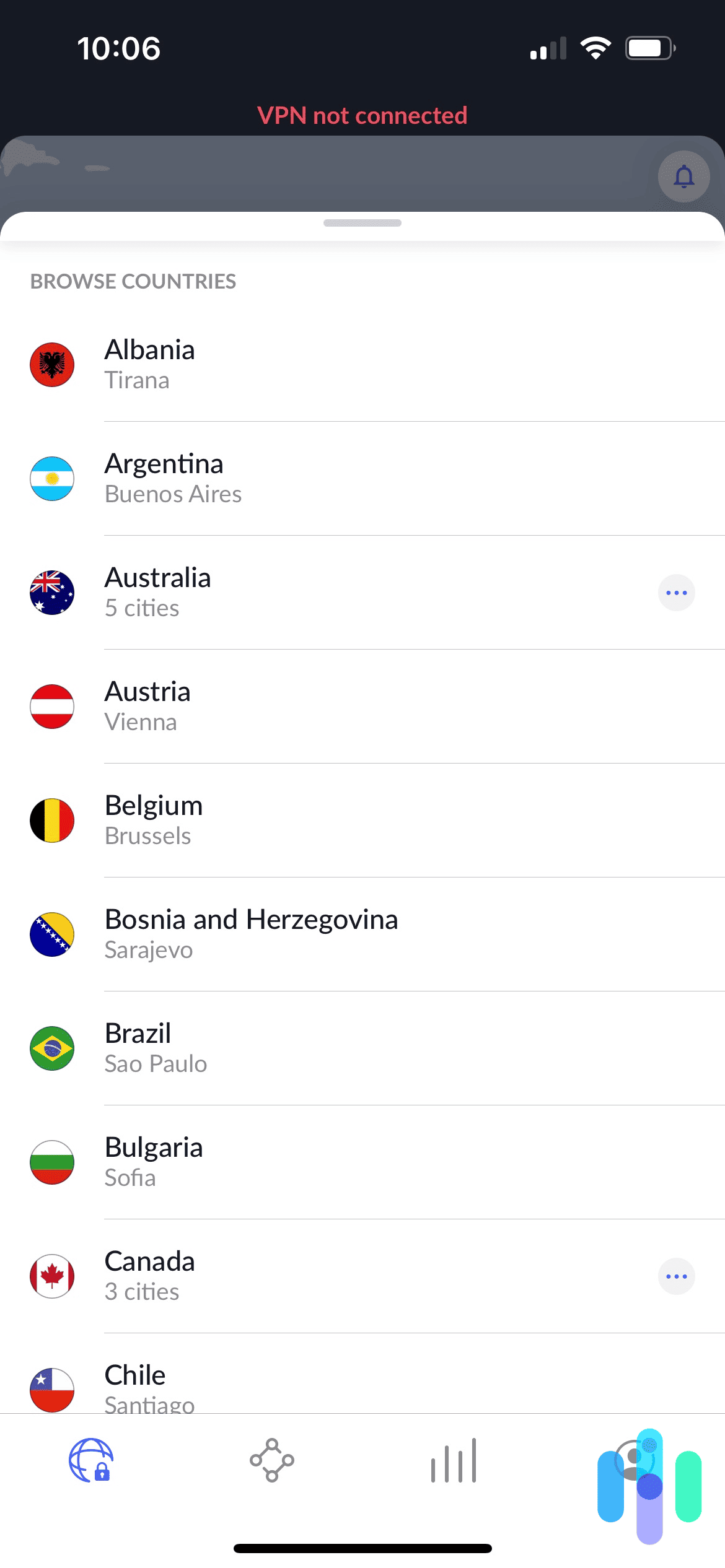
>> See More: The Best VPNs in Japan
What Types of Websites Are Blocked in India
Not sure where to start using your VPN? There’s a number of blocked websites in India, but most notable are torrent websites.
Downloading torrents allows internet users to access pirated media like movies and music. That is, of course, illegal, and we don’t condone doing it. However, there are types of files and media you can legally torrent. Plus, torrenting makes it easier to share files with others, as it’s done through a peer-to-peer connection in which users send data packets directly to each other rather than to a host website.
We’ve reviewed the best VPNs for torrenting, and the good news is, most of our top picks for India are also on that list.
>> Read About: How to Download Torrents Using VPNs
Conclusion: VPNs Are a Must-Have
With worsening online privacy conditions in India and the rest of the world, using a VPN is a must. Certainly, the CERT-In law has made choosing a VPN to use in India a bit more difficult, but there’s still a number of great options out there. NordVPN, Surfshark, Proton VPN, Private Internet Access, and ExpressVPN, for example, may have closed down their servers in India, but they still offer Indian IP addresses via virtual servers and fast servers close to India. So if you’re ever in need of a good VPN to use whether you live in or are traveling to India, they’re your best options.
FAQs
Still have questions? Take a look at our answers to the ones you ask most frequently.
-
Which VPN is best for India?
NordVPN is the best VPN for India because of its impressive security and privacy features, including a feature called multihop. NordVPN no longer has physical servers in India (to protect users from the new privacy law passed by the country) but it still has servers in neighboring countries.
-
Which free VPN is best for India?
Proton VPN is the best free VPN for India. It’s located in Switzerland, a country with no data-retention laws, and the company maintains a strict privacy policy. It doesn’t collect any information related to browsing activities. Proton VPN’s free version doesn’t impose any speed limits, and it also provides unlimited data.
-
Which VPN is fastest in India?
Generally speaking, Private Internet Access has the fastest VPN speeds in India. There are three kinds of speeds that matter to a VPN: download speeds, upload speeds, and latency speeds. It’s important to remember that speeds will differ depending on the type of device you’re using. In other words, other VPNs may be better than Private Internet Access if you’re talking about a particular type of speed on a particular type of device. In our tests, however, we discovered that PIA has the best speeds if you’re taking all the options into account.
-
Are VPNs legal in India?
Yes, VPNs are legal in India. The country has no specific laws that ban the use of VPNs. As in most countries, however, you can still be arrested if you use a VPN to conduct illegal activities such as downloading copyrighted materials.
-
The Times of India. (2022). Explained: What the new VPN rules means for internet users in India.
timesofindia.indiatimes.com/business/india-business/explained-what-the-new-vpn-rules-means-for-internet-users-in-india/articleshow/91510719.cms -
Statista. (2023). Roommate: Share of Linux in desktop operating systems market across India from January 2021 to December 2022.
statista.com/statistics/934972/india-linux-share-in-desktop-os-market/ -
NordVPN. (2022). India orders VPN companies to collect and store user data.
nordvpn.com/blog/indian-servers-removal/ -
India Times. (2021). At 62.45 Mbps, India Achieves Highest Ever Average Internet Broadband Speed.
indiatimes.com/technology/news/india-average-internet-broadband-speed-ookla-speedtest-549615.html -
Freedom House. (2023). India: Freedom on the Net 2023.
freedomhouse.org/country/india/freedom-net/2023 -
Surfshark. (2023). Surfshark shuts down servers in India in response to data law.
surfshark.com/blog/surfshark-servers-certin-india


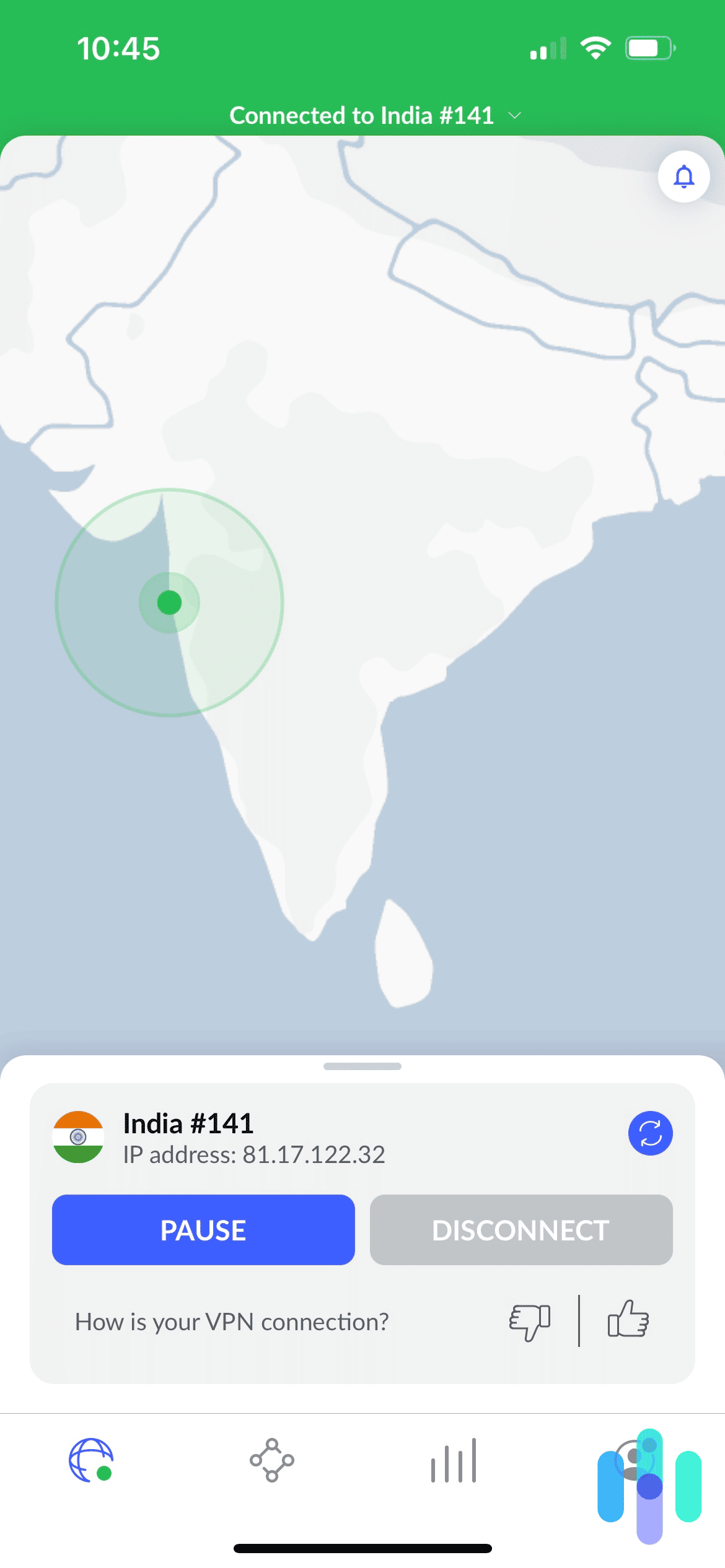 NordVPN connected to India on iPhone
NordVPN connected to India on iPhone